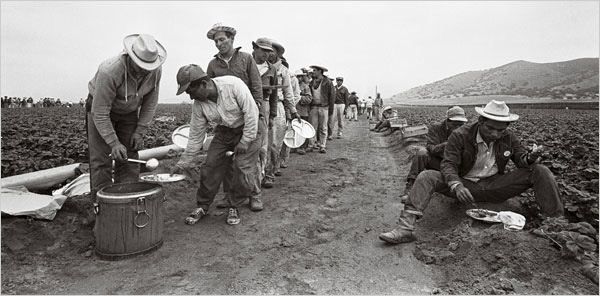
|  |  |  News Around the Republic of Mexico News Around the Republic of Mexico  
Half-Century Late Pay to Mexican Workers Again Delayed
 Frontera NorteSur Frontera NorteSur
go to original
February 23, 2010


| | Braceros, here in 1963, were often farmhands. (Bettmann/Corbis) |  |
Approved by the Mexican Congress in 2005 during the administration of President Vicente Fox [2000-2006], a program to compensate survivors of the 1942-64 Bracero Program of temporary labor between the US and Mexico has fallen short of its goal.

At a Mexico City meeting held earlier this month to inaugurate a special congressional commission to monitor the compensation process, Mexican legislators harshly criticized the existing program for being rife with red tape. Incomplete lists of beneficiaries, missed payments and insufficient funding were other problems cited by lawmakers.

Congressman Alejandro Encinas, a former mayor of Mexico City who coordinates the Party of the Democratic Revolution fraction in the lower house of Congress, said he hoped the new commission would help get the compensation issue resolved by January 2011.

Initially approved with a $30 million budget, the bracero payment fund was established to compensate former braceros or surviving family members for paycheck deductions of 10 percent that were withheld decades ago, and supposed to be paid to the guest workers after they returned to Mexico. Eventually channeled into a Mexican government-run bank, Banrural, the money disappeared sometime in the 1970s.

Paying former braceros their due, Encinas said, was a matter of justice for workers who were "defrauded by the state," even though their sweat and toil boosted both the US and Mexican economies.

After mass protests of ex-braceros in Mexico and the US broke out years later, the Mexican Congress agreed to a compensation amount of $3,800 payable in ten installments. At the first session of the new special bracero commission this month, Queretaro Congressman Alfredo Francisco Lugo of the Institutional Revolutionary Party (PRI) called the $3,800 payment an "absurd" amount.

Present for the commission's inaugural session, an official with Mexico's Interior Ministry who is charged with coordinating the compensation program with the states, acknowledged as many as 6,000 errors have been detected in the administration of the fund. "There have been mistakes, but we have been correcting them," said Alan Nahum, state coordinator for the Interior Ministry.

According to Nahum, five million bracero contracts were issued during the life of a program that brought Mexican workers to work on US farms and railroads, but many of the work agreements were awarded to the same individuals multiple times. In total, 139,000 beneficiaries have been identified for compensation, Nahum said.

The Calderon administration official stressed that 5,000 people who applied for compensation at Mexican consulates in the US have been unable to collect their money in Mexico. The probable undocumented status of the eligible beneficiaries puts them in a Catch 22 [situation], Nahum said.

"If they come to Mexico they cannot return," he added. Calling for greater communication among the different parties involved, Nahum said the Interior Ministry was fully committed to moving the compensation process forward.

"I'm 100 percent Mexican but from an immigrant family," Nahum said. "I know what it is like to suffer when one country is changed for another."

PRI Congresswoman Diva Hadamira Gastelum, special bracero commission president, joined other legislators in urging a speedy resolution to a long-standing problem she called the "oldest" and most persistent human rights violation in Mexico.

On a related note, a group of former braceros from the southern state of Guerrero has sued Mexico's Labor Ministry over the back payments owed.

Felipe Monroy Sandoval, leader of the Alianza Ciudadana Braceroproa organization, accused the federal government of blocking former braceros and family members from benefitting from the compensation fund.

Lack of resources, Monroy charged, was behind the delays. "They already paid (money) out, but there is a lot of demand and nothing to pay it with."

Funding for bracero compensation is subject to the normal budgetary process under the control of Mexico's lower house of Congress. As time drags on, less and less of the elderly ex-braceros are alive to receive money which should have been paid to them decades ago.

Sources: Canal del Congreso, February 2, 2010; El Sur, January 29, 2010. Article by Cristine Sierra Rosas.

Frontera NorteSur (FNS)
Center for Latin American and Border Studies
New Mexico State University
Las Cruces, New Mexico
|

 |
|  |



